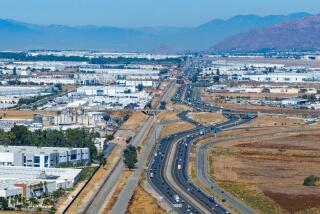Hawthorne Gives Final Approval to $200-Million Cloverleaf Project
As part of its effort to revitalize the blighted southwest corner of the city, the Hawthorne City Council has unanimously approved plans for a $200-million redevelopment project.
The developer, Cloverleaf South Bay Ltd., was given final approval Monday to build up to three hotels, 465 condominiums, a retail center, restaurants, a child-care center and a health club on a 28-acre site south of Rosecrans Avenue and west of the San Diego Freeway.
The site for the Cloverleaf project is a hodgepodge of land uses, with 25 residences and about 40 commercial and industrial properties. City officials said it will take about a year to acquire the land from 60 property owners in the redevelopment area. They said the project is targeted for completion in 1993.
Before making their decision, council members listened to more than two hours of testimony from about 20 residents, business owners and attorneys representing property owners in the project area. About 100 people crowded the council chambers.
Opinions Divided
Testimony on the project was evenly split, with half the speakers saying the project will breathe new life into a run-down neighborhood and the other half saying it is too dense and will create traffic problems.
Kathy Lawson, a resident of the nearby Holly Glen neighborhood, said she supports the project because it will improve Hawthorneâs image and eliminate an area she called an eyesore.
But Carol Mayer, another Holly Glen resident, said she has collected signatures from about 500 residents who oppose the project because they fear it will cause traffic problems.
Bud Cormier, assistant director of redevelopment, told the council that the Cloverleaf project is a âvery well-balanced, mixed-use projectâ and would have an âoverwhelmingly positiveâ effect on the city.
Tax Income Expected
The project would also be a major source of revenue for the city, he said. The developer has been given the option of building either two or three hotels, depending on market conditions. If three hotels are built, the cityâs income from hotel and sales taxes is expected to average nearly $1.5 million a year during the first five years, according to a city report. With two hotels, the annual revenues would be about $850,000.
In addition, Cloverleaf has agreed to pay the city $500,000 for administrative costs at a rate of $100,000 per year for five years. Cloverleaf will also contribute $1.5 million for improvements in the cityâs Police and Fire departments.
To acquire the site, Cloverleaf will produce a $46-million letter of credit, which the city will use to purchase the properties and relocate businesses and residents. Half of that amount will go toward the cost of the site. The other half will be returned to the developer through city subsidies of property, sales and bed taxes over 10 years.
In reaction to a speaker who accused the city of failing to study all the financial and environmental ramifications of the project, Cormier said: âThis is a solid project. This project has been analyzed upward, downward and sideways.â
Other Plans Fell Through
Although some residents fear increased traffic problems, Redevelopment Assistant Beth Garrow said in an interview that the Cloverleaf project is expected to generate considerably less traffic than two previous proposals for the site. The plans by two other developers, which have fallen through for various reasons, primarily contained office space and would have created a considerable amount of peak-hour traffic, she said.
The so-called âurban villageâ is designed so that people can live, work, shop and play in their own neighborhood, keeping them off nearby overburdened streets and freeways, she said. In the Cloverleaf project, traffic from residents, hotel guests and shoppers would be spread throughout the day, Garrow said.
Still, the project will increase traffic on adjacent streets by an estimated 11,820 vehicle trip per day, a city environmental report says. The site currently generates about 6,660 trips per day.
Cloverleaf Vice President Rex Swanson said Monday that Cloverleaf has agreed to contribute $1.2 million toward traffic mitigation measures, such as widening streets and adding turn lanes.
Traffic Tie-Ups
Without such measures, the report said, the project can cause traffic tie-ups at the intersections of Rosecrans Avenue and Aviation Boulevard, Aviation and Compton boulevards, and Inglewood Avenue and Compton Boulevard.
The report also studied the impact of several projects within a one-mile radius, including the 38-acre Mattel redevelopment project, which would increase daily vehicle trips by 17,570.
The Mattel project, which would create 500,000 square feet of office space, restaurants, a hotel and retail space on a site next to the San Diego Freeway, was challenged last week in a lawsuit by the city of Lawndale.
The suit charges that Hawthorne did not properly assess the cumulative environmental effects of the Mattel project and other major developments planned for the area. Garrow said Lawndale failed to express its concerns during the 45 days allotted for responses to the environmental impact report on the Mattel project.
However, Garrow said both Lawndale and Hawthorne officials are willing to discuss the matter, and she said she hopes the dispute can be settled out of court.
In a separate action Monday, the Hawthorne council voted unanimously to rezone 80 acres near the intersection of the 405 Freeway and Rosecrans, including the sites for the Mattel and Cloverleaf projects. The new zoning would allow a mixture of commercial and other uses including condominiums, restaurants and hotels.
More to Read
Sign up for Essential California
The most important California stories and recommendations in your inbox every morning.
You may occasionally receive promotional content from the Los Angeles Times.







